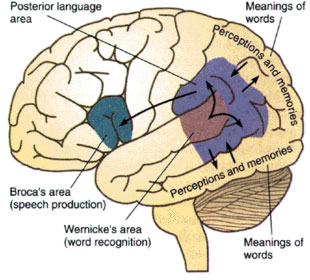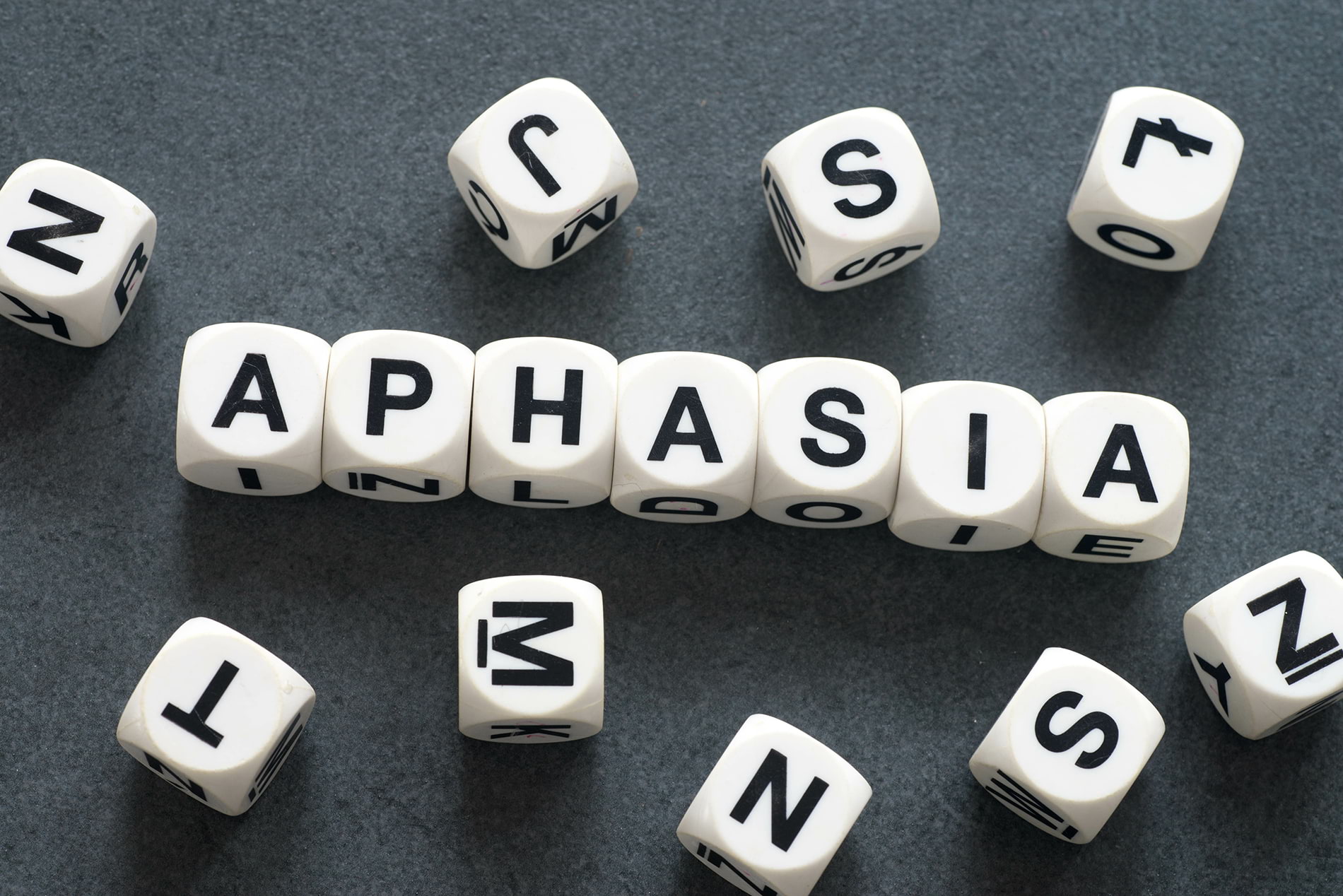Understanding Aphasia
Expressive
Problems with spelling, sentence structure, verbal reasoning, and rate of speech. The most common type of expressive aphasia is known as Broca’s aphasia. With this a person is able to understand language but unable to speak fluently. Instead they speak in 2 or 3 word sentences and may use gestures to help express ideas. Typically, smaller words, such as articles (a, an, the) and prepositions (of, from, etc.) are not used. For example, when a person with Broca’s aphasia or nonfluent aphasia talks about a plane trip they might say, “Plane . . . me. . . .” and spread their arms like wings to make the point. Broca’s aphasia also involves the inability to repeat or write things that are heard.
Another part of expressive aphasia are neologisms the use of nonsense words in place of real words. Anomia is a form of expressive aphasia that leaves a person unable to name (familiar) objects, almost as if he or she were talking in a foreign language. A less troublesome form of this problem is dysnomia, which causes you to search for words that you know, but simply can’t think of. “It’s on the tip of my tongue,” is a statement common for people with word-retrieval problems.
Receptive
Wernicke’s Aphasia includes both fluent aphasia and receptive aphasia. Fluent aphasia is a type of expressive aphasia that results in speech that is properly pronounced, grammatically correct, and effortlessly produced. However, it is often fast, wordy, and lacking in meaning. Receptive aphasia causes problems with reading, and understanding the meaning of spoken and written words. Your ability to say words may be unaffected, and even though you may be able to hear the conversation of others, you may not be able to comprehend it. Or you may be able to comprehend it, but get stuck processing one part of what is being said and missing the rest of the conversation. You may also engage in a great deal of meaningless speech.
Conduction Aphasia
Is seen as halting speech with trouble finding and rephrasing words.
Perseverative Speech
Involves staying on one topic for too long or being unable to control repeating of words, phrases, sentences, or ideas.
Paraphasia
Is a type of receptive or expressive aphasia where someone switches parts of words or syllables for real words.
Alexia
Another form of receptive aphasia, is the inability to understand written language.
Dyslexia
Dyslexia involves problems with reading.
Mixed
Problems with both the comprehension and expression of language.
What are the Causes?
A brain injury can result in aphasia; either from an acquired injury; stroke from a clot to the brain; cerebral bleed (aneurysm) and/or a traumatic injury. A traumatic brain injury is the result of from outside force such as a bicycle, auto, or football accident. In my situation, I had a cerebral bleed (aneurysm) while driving. I passed out and had a 60 mile an hour head-on automobile accident. Five months later I had brain surgery in the left frontal area.
Where in the Brain Does Aphasia Occur?
 Several areas of the brain help control your ability to form words, express yourself, and understand spoken words. Even small nerve-cell damage in one of these areas can affect your ability to process language. Injury to the lower left hemisphere of the frontal lobe can damage Broca’s area—one of your speech centers—and hamper articulation (the ability to pronounce speech sounds) and fluency (the ability to combine sounds and words smoothly). If other parts of the frontal lobe bear the brunt of the blow, both your ability to focus on what you are saying and be attentive to others in the conversation, may be affected. In general, you may be less able to use or understand verbal or written communication.
Several areas of the brain help control your ability to form words, express yourself, and understand spoken words. Even small nerve-cell damage in one of these areas can affect your ability to process language. Injury to the lower left hemisphere of the frontal lobe can damage Broca’s area—one of your speech centers—and hamper articulation (the ability to pronounce speech sounds) and fluency (the ability to combine sounds and words smoothly). If other parts of the frontal lobe bear the brunt of the blow, both your ability to focus on what you are saying and be attentive to others in the conversation, may be affected. In general, you may be less able to use or understand verbal or written communication.
Damage to Wernicke’s area, located in the upper left hemisphere of the temporal lobe, can affect your ability to hear and interpret spoken words. You may have trouble understanding language and as a result speak nonsense words out of context to the conversation. Language problems can also result if the tearing or stretching of nerve-cell fibers hampers your powers of concentration and your ability to store and retrieve information. In addition, right temporal lobe damage can cause problems with nonverbal communication, which involves gestures, body posture, facial expressions, and eye contact.
If there is damage to the frontal lobes, mainly the prefrontal cortex, conversation skills can be affected. People who have issues with executive functioning may offer vague, unrelated comments, or have trouble adding details to a conversation. They may also have difficulty with asking questions or giving comments, organizing speech and the ability to stay on topic (topic maintenance).



